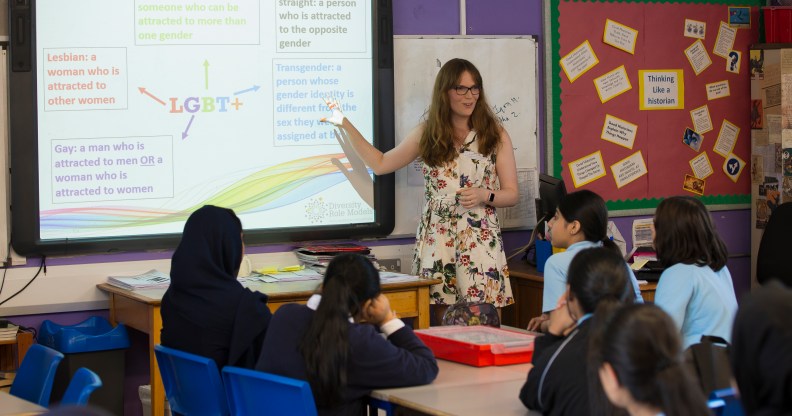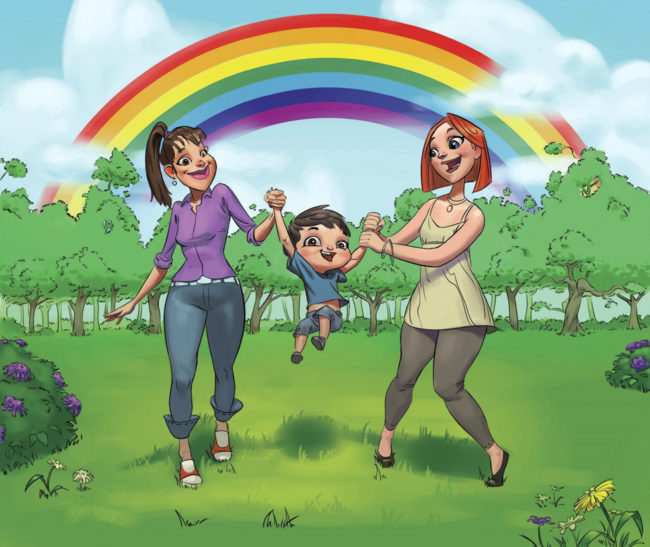LGBT issues should be ‘integral’ to kids’ education, doctors say

Children should be taught about LGBT issues, paediatricians told the government. (Diversity Role Models)
British paediatricians have expressed clear support for teaching about LGBT+ issues to primary school children.
The Royal College of Paediatrics and Child Health (RCPCH) published its response to the Department for Education (DfE)’s public consultation on changes to the Relationships Education and Relationship and Sex Education (RSE) curricula, which closed last week.
The doctors’ advice is not to shy away from teaching about sex education and LGBT+ issues, provided that educators address these topics in a “timely and developmentally-appropriate manner” for primary school pupils.
LGBT+ issues not sufficiently addressed in proposed guidelines
The paediatricians welcomed the suggestion that LGBT+ issues should be “integral” to the curricula, but noted that the proposed DfE guidance fails to sufficiently address them.
“There needs to be a clear statement that LGBT+ people and relationships are part of teaching about healthy relationships in primary school. This can be demonstrated in relation to families—but also it is helpful to children to learn the meaning of terms such as lesbian, gay and bisexual,” the RCPCH wrote in its response.
the 38-page proposed government guidance only mentions LGBT+ issues once.
The 38-page-long DfE draft guidance only mentions LGBT+ issues in one paragraph, which reads: “Schools are free to determine how they address LGBT specific content, but the Department recommends that it is integral throughout the programmes of study.”
The Sunday Times further reported last month that the DoE was considering giving private school the option to opt out of those classes altogether.
The vaguely-formulated statement in the draft guidance concerned LGBT+ rights campaigners, who feared that LGBT+ students and their needs may end up being further marginalised.

This drawing released by Croatian association ‘Rainbow Families’ shows an illustration from the first picture book for children about same-sex parents. (STR/AFP/Getty Images)
Following a Freedom of Information request in September, the campaigning group Level Up found that several respondents to the consultation were uneasy with the idea of teaching about LGBT+ issues and relationships at primary school.
“Providing young LGBTQ+ people with the information they need to have happy healthy relationships is essential, not optional,” LevelUp campaign director Bryony Walker said at the time.
Sex education is ‘important and essential’
The paediatricians also called for a more comprehensive approach to teaching about puberty, and the emotional changes it brings, as well as sex education.
The RCPCH defined sex education “an important and essential part of a child’s education” if taught in a way that is appropriate for the target age group.
“The guidance should be promoting this and recommending that all primary schools have a programme of sex education in order to meet pupils’ needs. As with relationships education, RCPCH firmly believes that sex education should not be separate from education about mental wellbeing,” the doctors’ response read.
It added: “Consent, healthy attitudes to sex, learning to keep yourself safe from sexual exploitation, online grooming and sexually harmful behaviour can all impact on mental wellbeing, and these issues should be taught within this context.”
A DfE spokesperson told The Telegraph: “We want all children to grow up to become happy, healthy and safe, which is why we are making Relationships Education compulsory for all primary schools as well as Relationships and Sex Education (RSE) compulsory for all secondary schools.”

